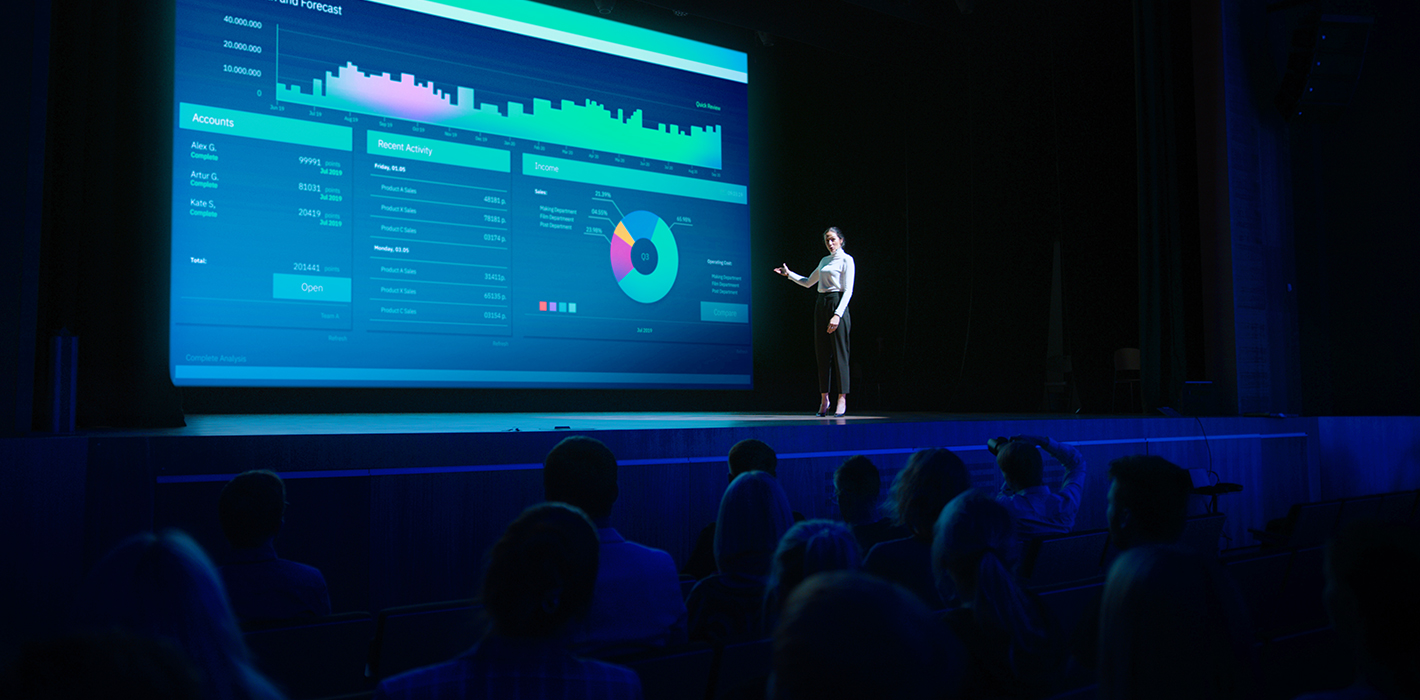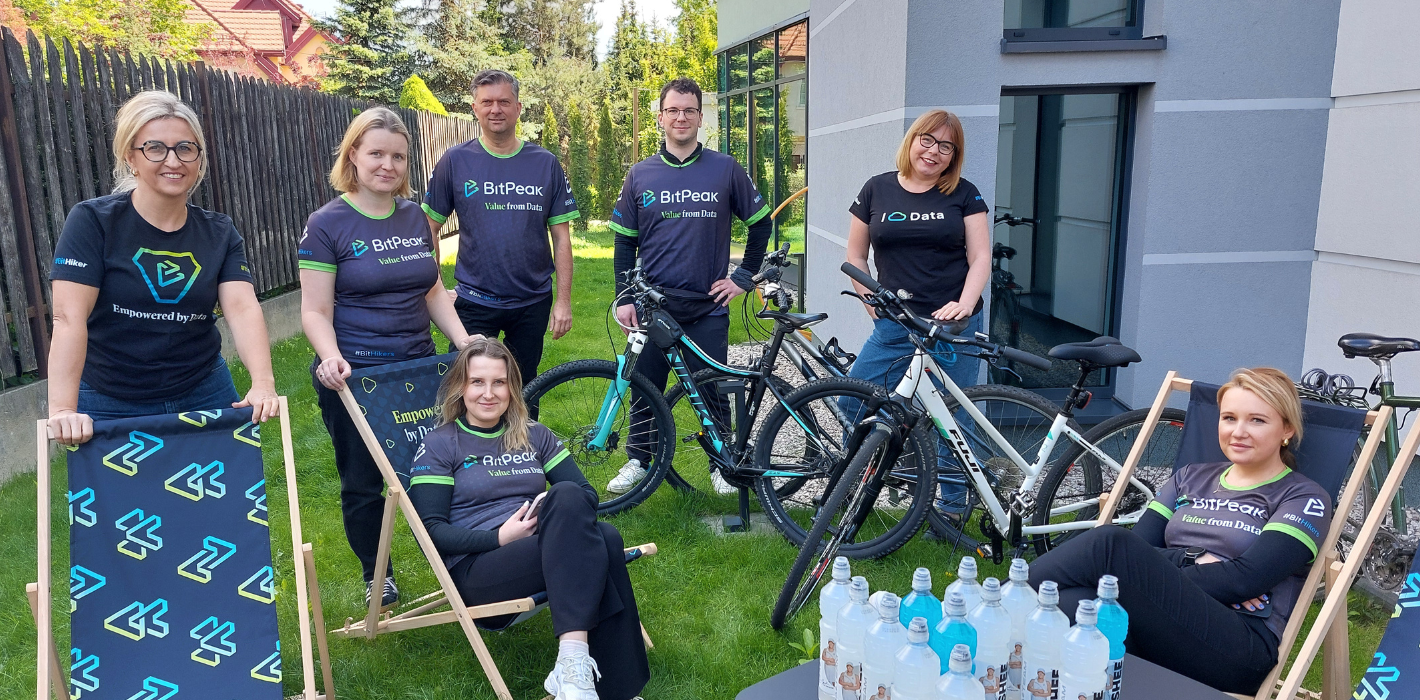Recently, BitPeak had another opportunity to connect with latest trends and industry insights during The IIBA Poland Summit 2023! This year’s summit was themed The Future of Business Analysis: Technology, Innovation, and Leadership and brought together a community of professionals from across the country and beyond.
IIBA Poland Summit 2023
The IIBA Poland 2023 Summit gathered approximately 200 people associated with Business Analysis in Poland. The conference provided a unique opportunity to learn about the latest trends, insights, and strategies within the field of Business Analysis. One of the main topics of the event was integration of Artificial Intelligence (AI) into the toolkit of business analysts. Speakers shed some light on the associated benefits and challenges. Additionally, a spectrum of solutions employed by business analysts was showcased during the presentations.
AI in Business Analysis
Presented by Susan Moore, the speech titled “Navigating the Intersection of AI and Business Analysis Work” provided a glimpse into the creative potential of AI. Ms. Susan demonstrated how AI could not only generate professional text information, such as case stories and defined business rules for specific scenarios but also poems that mimic the style of famous writer.
The integration of artificial intelligence into the field of Business Analysis has the potential to change processes of information gathering, scenario creation and requirements analysis. It can serve as a powerful tool for speeding up tasks, testing ideas, and revealing the pros and cons of various approaches. However, the promises of AI come with a fair share of responsibilities. The presenters in the AI block emphasized the importance of carefully verifying information obtained from AI systems. They correctly pointed out that AI-generated responses, while generally reliable, can sometimes lead to misinterpretation or misdirection when looking for specific details.
The next significant concern discussed was the challenge of bias. AI’s knowledge is derived from the data it has been trained on, and it tends to use a statistical approach, often leading to the production of stereotypically biased responses. For example when asking for a photo of a typical Business Owner, it is likely that AI systems based on pre-existing biases will then generate images of an older white man. To address this pressing challenge, diverse datasets and vigilant human supervision are necessary, ensuring the ethical use of AI. This highlights the responsibility that accompanies AI adoption, as machines are devoid of emotions or ethical judgment.
Additionally, AI, however advanced, has its boundaries. It cannot digitize every form of human knowledge, especially the intricate aspects of human inspiration and behavior. AI can only mimic people in the range limited by possessed information, for example, creating poems in the style of a writer it knows. In these situations, experienced business analysts can assist in understanding complex human problems and formulate relevant questions, especially when essential information is not available in well-structured formats. This highlights the irreplaceable role of human cognition in certain domains of business analysis.
Another speaker, Marcin Żmigrodzki, delved into the practical applications of AI within business analysis, focusing on “AI Support for Business Tasks”. He rightfully highlighted that Artificial Intelligence excels in typical and standard systems but faces challenges with unique and customized systems with complex entity relationships and dependencies. AI systems like Chat GPT are adept at providing answers to general questions but might hallucinate when it comes to specific and detailed inquiries.
Artificial Intelligence capabilities shine in tasks like filtering large datasets for relevant features and quickly summarizing extensive texts in various formats, such as legal documents, images, and unstructured data, providing structured and synthesized information. Nevertheless, AI-generated responses are often based on shallow analysis and may struggle with revising information and comprehending complex schema texts due to their inherent limitations in symbolic thinking.
In conclusion, our exploration of AI’s role in business analysis indicates that we can use its power right now. However, we must be cognizant of its limitations. Nonetheless AI can serve as a valuable source of information, helping us in our tasks, and providing a fresh perspective on the issues we analyze. It can assist in debugging and offer broader insights into the problems we face, making it a powerful ally in our journey to enhance business analysis.
Product Thinking in Business Analysis
During the conference, the presentation by Anna Kochanowska turned out to be particularly intriguing. Her session revolved around the notion that “Product thinking is BA’s superpower”. In her own words, “Product Thinking” is the art of “doing now what the client needs next,” a concept that challenges our approach to work.
She delved into a topic that is often the bane of innovation – what she termed the “build trap”. This is the tendency of the project team to transform into a feature factory, focusing on delivering what customers explicitly request, all with a sense of routine. Such an approach stifles creativity, limits openness to new ideas and makes it difficult to meet the changing needs of customers.
“Product Thinking”, in contrast, appears to be a visionary solution, referring to the new paradigm of agility. At its core, it places customers at the center of attention. The product becomes a flexible entity, carefully tailored to the individual needs of the customer. The speaker emphasized that “Product Thinking” goes beyond the world of software and technology, recognizing that every client has a distinct perspective and preferences regarding the desired product. Moreover, every component influencing product consumption and value delivered is carefully considered and integrated. This holistic mindset leads to better user experiences and products that meet a variety of needs of customers.
The essence of “Product Thinking” lies in its commitment to challenge every aspect of the final product, from requests, through ideas to requirements. This requires a continuous process of exploration and validation, manifested by solution testing and experimentation. “Product Thinking” emphasizes an open-mindedness, recognizing that answers can be obtained from unconventional sources, often from people outside the immediate team or enterprise. This cultivation of open thought processes fosters increased creativity and novelty, resulting in solutions that deliver significant business value.
Anna Kochanowska emphasized that within the realm of “Product Thinking”, the principle is to break free from routine and adopt a daring and experimental mindset. This approach imitates the role of a crazy scientist, who is not afraid to explore uncharted territories and discover unconventional ideas. It is an environment where risk-taking and creative thinking are valued. The presentation highlighted the significance of each team member’s contribution, emphasizing that facilitating collaboration is an important pillar of “Product Thinking”. This holistic and customer-centric approach empowers Business Analysts to proactively meet client needs, sometimes even exceed expectations, and become drivers of positive change within their organizations.
Summary
The IIBA Poland Summit 2023 served as an informative journey into the constantly developing sphere of Business Analysis. For professionals in this field, it offered a valuable repository of insights and discussions that will undoubtedly shape the future of this discipline.
During the conference, participants engaged in substantive dialogues, delving into the subjects that took center stage, including the integration of AI and the role of Product Thinking. These discussions not only contributed to a deeper understanding of these key topics, but also enabled the exchange of views and finding common points among attendees. Outside the lecture hall
However, despite many positives, there was a small flaw in the image of the conference. Namely, parallel sessions and the lack of previously available abstracts of the presentations did not allow me to properly plan my participation in the conference. This limitation impacted the ability to choose the speeches with the highest business value.
As a #BitHiker, combining technological solutions with a business perspective is a fundamental principle of our identity. Using our extensive technical knowledge and expertise, we are well prepared to face the challenges related to the sphere of Business Analysis.


 (+48) 508 425 378
(+48) 508 425 378 office@bitpeak.pl
office@bitpeak.pl








